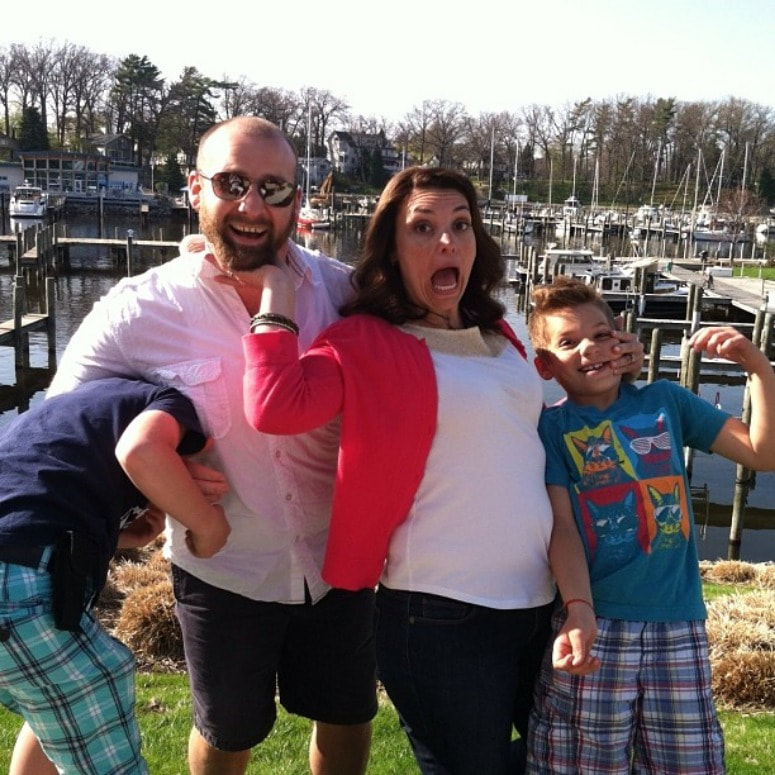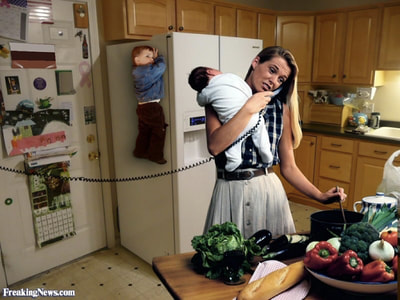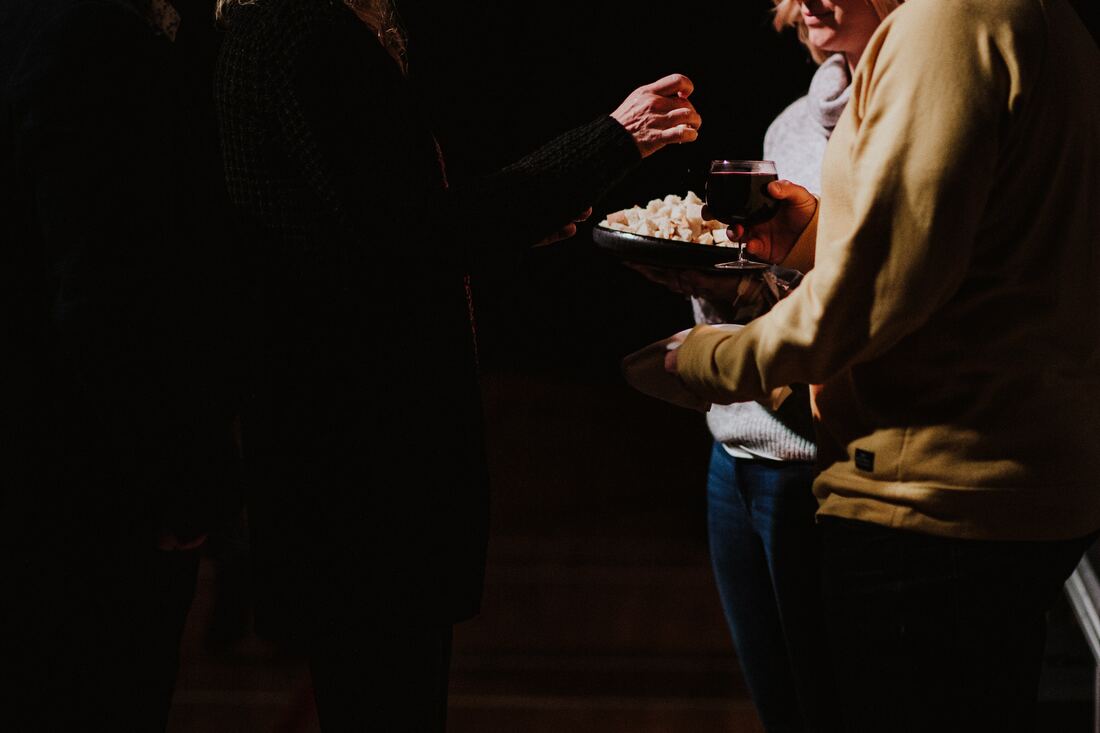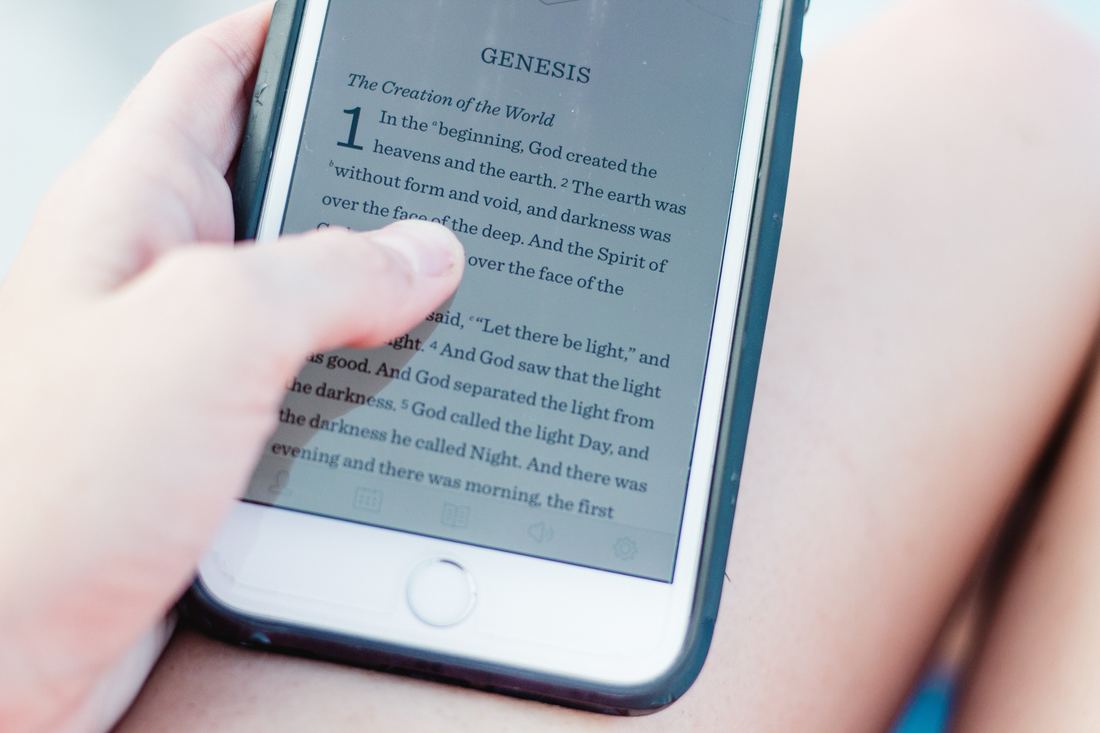|
Look around next time you go out to eat. What do you notice? There’s a TV on and almost everyone has a cell phone in their hands. Even the baby sitting at the table next to you has a tablet of some sort entertaining her. People are so connected to their devices that we’ve lost the art of connecting with people on a personal level.
My family is no different. This is a constant struggle for us. I find myself waiting to hear if any notifications go off. Study after study has shown this is a real issue for our generations. It’s one thing to say that we want to set our children up for success. It’s a completely different thing to actually create a plan to accomplish that reality. I realize that everyone has a different idea of what success is. I think we all can agree that success doesn’t just happen. If it did, every February everyone would have the ideal body size and type, everyone’s bank accounts would be in great condition and you’d have that dream job. No one hopes to get through life having contributed very little or not leave a legacy. We should recognize the responsibility and gift it is to raise our children. Out of every human being possible, God chose you to be the parents of your children. Don’t miss the gravity and importance of that statement. God chose you! Our greatest contribution in life might just be the children we raise. The goal of raising our children so they are set up for success isn’t one that we should just glaze over either. A goal worth setting is one that we should be willing to give the attention and intentionality it deserves. Translation, there’s going to be work involved in this process. There are going to be habits formed and habits broken that are going to be uncomfortable, but we must keep the end goal in mind. Study after study points to eating a meal together around the dinner table is the number one factor in the success of any child. Learn the art of disconnecting in order to truly connect. This means no devices at the dinner table. The TV is off, no toys and no distractions. There’s nothing for individuals to hide behind in order to connect. In the Ulrich household, everyone (guests included) surrender their devices during this time. If a guest isn’t willing to surrender, it might result in a game of Cell Phone Roulette. What is Cell Phone Roulette you may ask?The person with the cell phone gives it to the person to their left and the person on their left opens their contact list and swipes up…. Stops on a random contact calls that contact. The person on the left then hands the phone back to the owner and has to have a phone conversation with that contact for a minimum of 60 seconds. This reduces the distractions allowed during this time. We lie to ourselves over and over again thinking we can multitask, but in reality, we can’t. There is no such thing as multitasking. See Greg McKeown's book Essentialism. Learn the art of connecting by rewinding together. After we’ve disconnected from our devices and started to connect, there are some questions we should ask each other. We answer these three questions almost every night: What made you glad today? What made you sad today? What made you mad today? You can come up with your own questions to ask and answer. The main point is that we spend time rewinding our days. We don’t simply coast through the days and consume food, but we intentionally connect and engage each other. You’ll be shocked at how much your children want to know how you as their parent and what went on during your day. There’s no need to give them all the details. Simply answering those questions gives them a glimpse into adulting. Learn the art of building each other up. This is the most difficult one to learn and live out. It’s easy for me to correct and guide. It’s not natural to build and encourage others up. Our table is a safe place for our family. We intentionally work to make it that kind of place. There are several times that Heather looks at me and lovingly corrects me when I’m aggravating embittering our sons. There’s a fine line of overcorrecting. It’s easy to cross it too. Learn the art of encouraging each other. I believe with everything in me that when we give our families the intention and attention they deserve, we’ll leave a lasting impact on the world. Our legacy will outlast most of our accomplishments, raises we receive at work or certificates that hang in our offices. Our greatest contribution in life might just be the children we raise.
0 Comments
If you’ve stuck with us this far into the miniseries, I’m so glad. If you are jumping in right at the end, feel free to go back to the previous posts. Up to this point, you might be thinking it seems simple enough, but let’s face it, some of us are living pretty crazy lives just to make this life in crazy town actually work. Some of us can barely make dinner a reality let alone be intentional about it.
So what do you do if you work a crazy work schedule? What do you do if your child is in the last years or even weeks of high school? Time is limited and so is your energy. When my youngest son entered kindergarten, I realized my time with him was essentially gone. When he was at school, I’d be home. When I was at work, he’d be home. It was a devastating realization for me as a dad. I realized I had to change work schedules, but in the meantime, I couldn’t wait until that happened. So, I looked for creative ways to stay involved in my sons’ lives. I decided that each week I would have lunch with them at their schools. This usually meant I sat in an extremely small chair surrounded by other kids and would have to engage in conversations about legos, superheroes and farts (don’t judge, your kids do it too). Fridays, I would come home from work, stop by a McDonald’s and pick up apple pies and other kinds of snacks. I’d wake them up and we’d watch TV while eating our snacks. In the winter, we’d get bundled up and head out to play in the snow. In the summertime, we’d go and look at the stars. Each of us has 24 hours in a day. We’ll never be able to find more time. As parents, we must intentionally create moments in time that help us connect with our children. My oldest son just entered high school. My wife and I realize that our weeks with him are slipping away. We are coming to the final stretch with him. I’ve had to re-evaluate what creating these moments will look like. I know that these years of high school will be full of crazy sports schedules, friends, eventually awkward dates and school dances with girls. Intentionality is key when creating moments that will help us create lasting memories. I foresee "guys only" weekend camping trips and driving lessons in which I don’t lose my ever-loving mind in our future! I’m learning that the key isn't balance. The key to success in life is to be fully present where you’re at. If you’re at work, give it 100% of your attention. If you’re at home, give your family 100% of your attention. It’s so easy to fall into the trap of comparing our realities to the perceived realities of others we see on social media. Don’t compare your life to the filtered perfection of others. Instead, focus on intentionally creating memories your family will remember! Photo by Piron Guillaume on Unsplash Just to clarify any confusion, my family is normal. In fact that imagine attached to this blog is my family. We were with some dear friends of ours at South Haven, MI posing for a picturesque family photo, when this happened. We are normal. Just this week we’ve had to break up fights between my sons. I actually had to say these words, “No you shouldn’t fart on your brother’s head…” among so many other ways of correcting our sons. I lose my temper. At times, I feel like I’m losing my mind parenting our boys. As we wrap up this miniseries, I hope you’ll resist the temptation to fall into the comparison trap. It’s a trap. We all do it to some degree, but it’s a black hole of sinking sand that we can get lost in. A few years ago, I had to go to the store and pick out a picture frame. I needed something simple but creative. I stood in front of the picture frames for several minutes seeking the perfect one. It hit me while I was looking through the frames, that every picture in them was the same. All of them pictured a couple with some children and a small animal of some sort. Everyone was smiling too, even the dogs! None of them seemed stressed, The siblings weren’t fighting or pulling out each other’s hair. Everything looked peaceful and serene. Strange. My family rarely appears that way. In fact, my family rarely acts that way anymore. Maybe picture frame companies should start putting real family photos in their frames. That could be fun. Real families like these... Most importantly, I hope that as we’ve worked through this miniseries, you’ve resisted the comparison trap. The comparison trap is everywhere. We shouldn’t compare ourselves to the filtered perfection of others we see on social media, youtube or any other platform. Behind every Instagram worthy photo are dozens of photos like what we see above.
There isn’t a perfect family. The point of the these blogs has not been to compare one family to another. The point has been to encourage you as the parent to give your family the attention and intentionality they deserve. I believe you can lead your family well and set your children up for success! If we can ever help you to better lead your family, please don’t hesitate to reach out. At RE.THINK, we have many resources and useful tips that can set you and your family up for success. Please feel free to contact me at [email protected].  So we normally don’t go THAT deep in a message, and we strive to be clear rather than deep. This week we realized we needed to go deep in order to be clear. To that end, we want to make sure we didn’t just glaze over details and other information during the message this weekend.
Below are all the notes from Marc’s message: -Paul starts the Corinthian church around 50 AD. -According to Acts 18 24-26 Apollos a believer in Jesus, but lacks foundational teachings and theology speaks in Ephesus. Some of the early church leaders Priscilla and Aquila teach Apollos more theology. Eventually, Apollos wants to head toward Corinth area. The order in which Luke refers to Aquila and Priscilla is crucial here. When we first meet this married couple they are referred to as Aquila and his wife Priscilla (Acts 18:1). That is the only time they are referred to in that order in the Bible. It appears that Priscilla is just as important or more important to Paul’s ministry as Aquila. 53-56 AD Paul stays in Ephesus during that time the Corinthian church seems to be imploding. Paul writes a series of 4 letters to address the internal issues. -Paul writes his 1st of four letters (not 1 Corinthians) to this church during these years. He references this letter in 1 Corinthians 5:9. -The Corinthian church sends a delegation of people from Chloe’s house church to get clarification on other issues in the church. Paul writes the 2nd letter and sends it back to this group of people from Chloe’s house church. (see 1 Corinthians 1:11) This is the letter we refer to as 1 Corinthians. At some point, Paul writes the 3rd letter and sends it to Titus. Paul refers to this letter as a sorrowful letter. It appears that he regrets writing this letter according to (2 Corinthians 7). He seems to be concerned for Titus and travels to Corinth through Macedonia. Titus and Paul cross paths in Macedonia. Titus gives Paul a report on the status of the Corinthian church, and Paul ends up writing his fourth letter, 2 Corinthians. Paul sends Titus and Timothy back to Corinth (2 Corinthians 8:17-18). Household Code See Aristotle's Politics Ben Witherington III click here Photo by Avel Chuklanov on Unsplash A couple of years ago, my wife invited me to go to the public library with her and our boys. I wasn’t going to go, but then I thought why not. I ended up walking around the library searching for something interesting. A small audiobook on disc with a bright yellow cover caught my eye. It was a book I hadn’t heard about. It was titled, God of the Underdogs. I picked it up believing that it was going to be just another book with little to no consequence. At the same time, our family was in the middle of a season of transition not knowing what our ‘next’ was or where our ‘next’ would be. We were in a holding pattern. Reading the contents of this particular book changed the course of our lives. The words that Matt Keller, the author, wrote in this book felt like they were written just for me in that particular season. There was a moment when I was driving to a meeting and literally had to pull the car over and “rewind” the disc so I could hear it again. After processing this book, Heather and I decided to change the course of action we were currently on. I can’t put everything into words, but I can honestly say that without the invitation to visit the library, I might not have ever come across this book. Without listening to that particular audiobook, I don’t know if I would have ever considered starting a church. These kinds of events happen all the time... blind dates, swiping right or a guy asking a girl out finally after having a major crush on her. These decisions can change the course of history. The seemingly simple act of inviting a friend to go on a run could start them down the path of becoming a marathon runner. This marathon runner could raise kids who not only watch their mom run marathons but want to be physically active as well. This could change the course of their family’s medical history of unhealthy patterns and habits and end obesity and heart attacks in their family tree. Taking the unseemingly small step and asking a co-worker to watch a big game with you in March might result in you guys becoming best friends. This could result in a lifelong family friendship that last decades and even generations. Inviting someone to something can change the course and trajectory of their life. What would happen if we lived our lives thinking this through? What could happen if we believed that we might actually improve someone’s life? What risks would we be willing to take? I believe that deep down every human being wants to do good and wants to help others improve. Inviting someone to encounter Jesus in an authentic way is the most important invitation someone can make. We may think it’s simple to invite a co-worker, friend, neighbor or family member to attend a church service, but that could change the trajectory of their life and their family for generations to come. So how should we do it? Should we just walk around and invite everyone and anyone? That’s an option, but I don’t believe it’s the best option. Here are three simple steps that we follow here at RE.THINK Church when inviting someone to attend a service here at RE.THINK. 1. Pray. We Pray that God will bring at least three people or three families to our mind that don’t have a relationship with Jesus yet. We truly believe that inviting someone to church could change their lives and the trajectory of their family. We know that God loves each person more than we do. We believe He longs to have a relationship with each person He created, therefore, we ask God to help. 2. Invest. Just like good wine, pairing matters. Invite cards pair well with gifts, notes of encouragement, kind words etc. Take some time and invest in someone’s life. 3. Invite. Take the courageous step and invite someone to join you at RE.THINK Church. Taking this courageous step literally could change their life. Let’s change the course of history by grasping one of the most powerful forces, the force of potential. The power of the invitation holds so much potential! Photo by Jessica Ruscello on Unsplash At RE.THINK Church, we start with the Bible in order to determine what is true, right and accurate. If the Bible isn’t clear about a topic, we’ll see what church leaders throughout history have said. We move to logic and then our own personal experiences from there in order to determine what is true, right and accurate. With that in mind, we acknowledge there are several faith traditions that have different opinions about what communion is and what it isn’t. The Bible is our foundation for understanding this sacred meal. We want to be clear and help people understand communion.
We must acknowledge that Jesus was a Jewish man who practiced Judaism. One of the central events and practices of Judaism is Passover. This reminds the Jewish people that God freed them from slavery in Egypt (Exodus 1-13). Jesus gathered with his apostles in an upper room in Jerusalem to celebrate Passover. The Passover Meal included a plate called a Seder plate that held very symbolic objects and meaning. The meal also involved 4 cups of wine each having their own symbolic meaning. For a more in depth explanation of the Seder Plate click here. During a Passover celebration with his apostles Jesus issued in a new meal with a new meaning and a new purpose. See Matthew 26: 26-30, Mark 14, Luke 22 and John 13. Jesus’ sacrifice to pay for humanity’s sin was just around corner. During this familiar meal, Jesus spoke to his apostles. He took the bread and blessed it and broke it while saying “This is my body which is given for you”. He also took a cup of wine and said “This is my blood which is poured out as an offering for the forgiveness of sins”. Jesus gave his followers instructions during this meal, First Jesus said, “Do this and when you do this, remember me and what I’m about to do”. Second, Jesus gave a new command, “Love one another”. As one can imagine, this meal became a tradition whenever the people of the church gathered. In some places, it became an issue. So, leaders in the church’s early days had to give instructions and reminders. The church in Corinth was one that had some issues. Their leader, Paul, wrote a letter to them to further the instructions and bring clarity. We encourage you to read 1 Corinthians 11 on your own some time soon. We want to point out one of the instructions Paul wrote about to the church in Corinth. Paul gives some of these instructions in I Corinthians 11:27-32. The instructions may seem a bit harsh, but they were meant to bring reverence back to the meal. Literally, people were getting drunk off of the communion wine. They were also just going through the motions when it came to communion. Paul’s instructions help us to evaluate ourselves and make sure that we are not just going through the motions or abusing the meal’s intention. What is communion?
We hope this helps you understand this sacred practice followers of Jesus have participated in for centuries. RE.THINK Church celebrates communion periodically throughout the year. For this installment of the miniseries we are going to link to Justin at That Christian Vlogger's Youtube channel.
Justin Khoe is a digital missionary. Known online primarily as, “That Christian Vlogger,” his Youtube videos have been seen around the world by over a million people. With over ten years of preaching, literature evangelism, and teaching experience under his belt, Justin’s current focus is to leverage social media to help reach unchurched young adults. Cohosting the show with him is his wife, Emily. Justin and Emily aim to equip young adults to have a stronger and deeper relationship with God and to help them discover who God has created them to be. They call this way of living, “experiencing faith in the first person.” You might not know this, but I am a record holder. To my knowledge, this record has stood the test of time for almost three decades. I’d say that’s pretty good! What is this record you might ask? I have made more Sunday School teachers quit after teaching me on Sunday mornings from Plymouth Wesleyan Church (the church my family and I attended while growing up). Most pastors probably wouldn’t be proud of this, but I am if I’m honest.
I’m sure there were many reasons as to why those amazing volunteers, who sacrificially and generously gave of their time and energy to teach me the basics of the Bible, decided to quit. One particular teacher told me that I asked too many questions about the Bible, especially when I discovered the books of Songs of Solomon and Ezekiel. Those are some pretty graphic books. I would read those newly discovered passages loudly and proudly wondering why the author of Songs of Solomon talked about a ladies breasts being like the fawns of a gazelle. I’d ask the teacher what fawns of a gazelle look like and if they really compared to breasts. All joking aside, no one really ever explained to me, in a way I could understand, WHY and HOW I should read the Bible so that it would add value to my life. I simply started reading the Bible when I got bored in church. Years went by. I kept reading my Bible in church when I was bored. I’d ask questions sometimes. Sometimes I would receive an answer and others, I didn’t. I didn’t really know why I was reading the Bible other than to occupy my mind When I was a teenager a volunteer leader in our church named Ed, started hanging out with me. We would go to Burger King every Wednesday and talk about my week. One week he mentioned to me about reading my Bible in church. He informed me that he knew of my reputation for Sunday School mishaps. We both laughed about my standing up proudly and reading Songs of Solomon in front of the whole class. Ed asked a question about how I applied what I was reading to my everyday life and how the scripture added value to my life. I didn’t know what he meant. He opened his old Bible to the book of Mark. We started reading all the way to chapter 5. I thought I was big stuff for reading five whole chapters of the Bible at once. I thought for sure I was going to get a gold star from God that day. Ed asked me what I noticed or what I observed while reading. One of the things I noticed, among several others, was that people were possessed by evil spirits. Ed and I had a great discussion about that while I ate my Whopper with cheese. I noticed that in chapter one and in chapter five Jesus encountered people who were possessed by these evil spirits. The strange thing to me was that these evil spirits recognized Jesus. They knew who Jesus’ real identity was. The Holy One of God. While religious leaders were confused about who Jesus was. This was odd to me. Ed and I continued to talk about all the other things we noticed and observed in these five chapters. Ed then asked me one of the most important questions of my life, “Marc, how can you apply that to your life?”. I stared for a long time, took at least three bites of my Whopper, ate my french fries and looked him and said, “Uh, I don’t know.” He asked the same question again and I still responded the same way. After a few attempts, Ed started blurting things out to help me apply my observations. He said, “The evil spirits knew exactly who Jesus was right?” “Were they right with God?” “Was God happy with them?” I looked at him with french fries hanging out of my mouth like they were fangs realizing for the first time in my life that I was on the verge of maturing. I didn’t know how I felt about ‘maturing’! Ed patiently waited for me to defang my french fries and waited for my answer. I looked at him and simply replied, “No, God wasn’t happy with evil spirits.” “But they knew who Jesus was, right?” Ed replied. “The Bible says they did,” I said. Ed pointed out that knowing Jesus and knowing who He is doesn’t mean that a person is right with God. It’s only part of the equation. Over the next several minutes, Ed and I talked knowing Jesus. I honestly assumed that I just needed to know the right answers, like my faith was basically a standardized test like the SAT or something. Realizing that knowledge wasn’t enough rattled me. Ed and I had several conversations sitting in a booth at that Burger King and this was one of the most impactful conversations of my life. It’s probably why I remember it 20 years later. Ed helped me to not just read the Bible but to understand what I was reading in ways that would actually apply to my life. By reading the Bible and applying what I read, it helped me mature in my new relationship with Jesus. He explained the S.O.A.P. method to me. S. Stands for Scripture. The part of the Bible I was reading. (Mark 1-5) I don’t recommend reading that much on a typical day, but it worked for Ed and me. O. Stands for Observations. Things I noticed. For example, I noticed that the evil spirits were in church and they recognized Jesus. Stands for Application. How would I apply what I read to my life? What next right step should I take to put into action that application? After my conversation with Ed and reading Mark 1-5, I realized that knowledge wasn’t enough to be right with God. I discovered that it took a personal relationship with Jesus to be made right with God. P. Stands for Prayer. Praying that Jesus would help me apply what I read. I strongly believe that the amount of the Bible a person reads is not important. I think the amount a person applies to his or her life is the crucial part. I have kept a S.O.A.P. journal for several years now. I think this is one of the most helpful tools as I read the Bible and mature in my relationship with Jesus. Photo by Ben White on Unsplash I get asked a lot of questions about the Bible. Which Bible is right for me? Which Bible is right for my 15-year-old son who doesn’t like sports, people or sunlight? In fact, he only likes dark rooms with large flat screen tv's with an attached Xbox…. You get the picture. Well, my responses vary quite a bit.
The Bible industry is a crazy industry for sure. There’s the metal Bible, Duct Tape Bible, pink camo Bible, pocket Bible and really big Bibles, I mean like really big Bibles! Just google it. It can be confusing as to which one might work for you. In our previous blog in this mini-series, we discussed briefly the comparison between paper Bible and digital Bible. To me, it doesn’t really matter. I enjoy the digital Bible more than a paper Bible. My wife prefers her leatherbound Bible. The mode doesn’t really matter. Another question I often hear is, “Should I just start reading anywhere or follow a Bible reading plan?” The Youversion Bible App is a great platform to use especially when just getting started. I enjoy reading through the various plans on the app. After a while, a person should be able to read the Bible on their own but you might also enjoy reading with a guided plan. In fact, if you only read with a guided plan, don’t feel bad or “less than” because of it. Another great option is That Christian Vlogger’s course. If someone is going to simply start reading the Bible, I recommend starting with the book of Mark. It’s a fast-paced book and covers the life of Jesus by describing His teachings and miracles. The second book I recommend reading is Acts. I always encourage an individual to read the Bible in a community like a small group, however. I think that’s one of the most beneficial ways of reading the Bible. The third most common question I receive is “How much of the Bible should I read each day?” The person who asks this question is usually a driven type A personality. He/she is probably used to getting a gold star in elementary school. Just kidding. Kind of. I know it’s a daunting question. I remember thinking I had to read chapter after chapter each day in order to belong, like really belong, to the "in group". My response is usually a combination of sarcasm and genuine concern. Here’s why. I’m not sure how much of the Bible the original disciples would have read each day. I don’t think that God measures our level of discipleship by the quantity of Bible we devour each day. I do believe that God measures our love for Him in regards to our daily obedience of what He writes to us in the Bible. If we follow Jesus’ command to “Love God with all of our heart, soul strength and mind”, we’ll be doing great. If we also follow His command to “love our neighbor as ourselves”, we’ll be doing even better!. Wonder how the world would be if Jesus’ followers were to only read the amount of the Bible we could actually live out? Another fact that influences my response to “How much should I read my Bible every day” is related to the fact that the chapters and verses haven’t been part of the Bible for very long. They were first introduced in the Geneva Bible which was published in 1560. I typically suggest reading enough of the Bible so that you learn something new about God and who He says you are and how it applies to your life. I always suggest journaling along with reading scripture. The method of journaling I suggest is called S.O.A.P. S.O.A.P. stands for Scripture, Observation, Application, and Prayer. We’ll cover S.O.A.P. in the next article of this series. Photo by Hannah Busing on Unsplash Have you ever thought “I’ll find my future job, spouse, house or child’s name by reading the Bible”? The Bible might be helpful for some of these things, but for me, it’s never been my ‘go to’ book for those types of things (even though my oldest son’s name is Shad). I think there’s another reason God wrote the Bible. When I first began the habit of reading my Bible each day, I started out strong but eventually fizzled out. I probably read Genesis a kajillion times. I was hoping to learn from my ancestors’ past in order to discover my future. The problem with Genesis was it was kind of boring to read. Parts of Genesis was also confusing and kind of strange. There are other parts of the Bible that can also be boring, confusing or strange to read. I came to realize that the Bible wasn’t written in America; therefore, it wasn’t written in modern-day language. It was written originally for a group of people that were part of the Eastern Culture in a time that’s considered ancient. It was written in a place that’s different than ‘Merica to a group of people that had a mindset very different from mine. I realized though that there were new things I could discover by peeling back the layers of culture and ancient truths I found in the Bible. I never did learn who I was going to marry based on these truths, but I learned a lot though :) I started reading the Bible for one reason, but quickly discovered what I think God’s intended purpose of writing the Bible was. I think the Bible was written so we could discover more about who God is and who God created us to become. Sometimes we read the Bible for the wrong reason. We might read the Bible trying to figure out who to marry, what job to take or hoping that God will point out a verse that will help us win the lottery. When we approach the Bible like that, we might struggle to find answers. I know I did. Changing my motivation for reading the Bible helped me understand who God is and who God created me to be. Now the question became “HOW I should read the Bible?”. There are literally hundreds of translations in the English language of the Bible. Some are better than others. They each have their own history and benefits. I personally started reading the New International Version (NIV). The reason was simple. All of the pastors I knew read the NIV translation. When I attended college for pastoral studies, we read the NIV, so I stuck with it. There was one small problem for me, I couldn’t understand the NIV wording all the time. I would secretly read the New Living Translation (NLT). The translation was accurate and the major difference was that I could understand it better. I now read a mixture of translations so I can hear the words of God in a fresh way over and over again. Here’s the list of Bible Translations that I personally read: NIV, NLT, The Message, English Standard Version (ESV) and recently one of my favorites is the New International Readers Version (NIRV). I’ve heard people passionately argue why and how one particular version of the Bible is the only REAL translation,or they will put down other translations. Don’t buy into their craziness. Just because someone is passionate about something, doesn’t mean they are right. Just because someone can passionately argue their point, doesn’t mean their right either! I used to feel really bad for jumping ship on reading the NIV, but I got over it. I’ve been a pastor for over 16 years now. I used to look for the biggest, most pastoral looking Bible I could find. I used to think that the size of my Bible actually meant something. (I’ll wait because I’m sure you’re thinking “Does size really matter?”. Now, you’re thinking of something completely different… like I said I’ll wait). OK. Now that you’re back with me, let’s keep going. I got over that issue quickly because I hated carrying around a heavy book all the time! I started to read my Bible on my phone in secret because people around me would talk down about how reading your Bible on your phone can’t have the same effect. Really? You can’t learn and discover truths about God, how much He loves you and the kind of person He created you to be? I’m pretty sure the words are the same in the Bible as they are on my smartphone? Every morning I wake up, put my earbuds in and listen to my Bible. The reason I listen to my Bible now is that I retain so much more truths about God and how much Jesus loves me. I use the SOAP method to help apply the truths I discover in the Bible. More on that to come in this mini-series. The bottom line, when it comes to reading your Bible, make sure you are reading so you can become the person God created you to be as you discover Him and His love for you. Don’t read a particular version of the Bible just because someone else tells you to. Read a trusted version that you can understand. If you’re like me and listening to your Bible is more beneficial than reading your Bible, don’t feel bad about it. It’s ok. It’s also ok to utilize technology and read your Bible on your smartphone. At one point printed words on paper was considered new technology. Photo by Jenny Smith on Unsplash |
WHy a blog?RE.THINK Church values being a church that is casual. Casual Church goes far beyond the way we dress, it's more about we expect people to take this journey at their own pace. We are here to journey with everyone. So we've created a blog so people can check us out before they show up for a service. Archives
March 2020
Categories |













